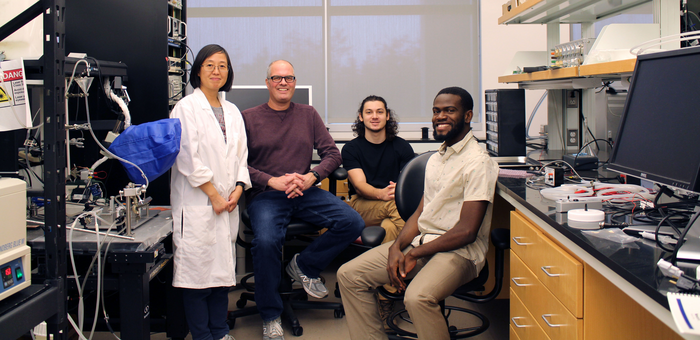NORMAN, OKLA. – Taste is a complex neurological experience that has the potential to provide extensive, and perhaps surprising, information on how the brain makes sense of sensations and the organization of brain pathways. A research project funded by the National Institutes of Health, led by Christian H. Lemon, Ph.D., an associate professor in the Department of Biology in the Dodge Family College of Arts and Sciences, aims to better understand how the brain processes taste and how those neural pathways can evolve.

Credit: Provided by Christian H. Lemon, University of Oklahoma.
NORMAN, OKLA. – Taste is a complex neurological experience that has the potential to provide extensive, and perhaps surprising, information on how the brain makes sense of sensations and the organization of brain pathways. A research project funded by the National Institutes of Health, led by Christian H. Lemon, Ph.D., an associate professor in the Department of Biology in the Dodge Family College of Arts and Sciences, aims to better understand how the brain processes taste and how those neural pathways can evolve.
Taste is connected to a range of neural activities such as the pleasure of tasting something sweet. Taste is a part of flavor, which includes the pain experienced in tasting a hot pepper. However, there is a gap in knowledge about how taste and flavor preferences develop and evolve over time.
“Taste is a component of flavor; it contributes sensations like saltiness and sweetness. When we’re eating food, we get a lot of pleasure from taste and flavor, but taste is actually a sensory system that we really don’t fully understand in terms of how it works in guiding eating behavior and also how it works in the brain,” Lemon said.
This project will build on a discovery made by Lemon’s research group while studying a part of the brain where taste sensations can excite neurons in the midbrain region. Importantly, many other senses from various parts of the body are processed in the same neural location, with preliminary data suggesting some body senses can activate brain cells excited by tastes. By determining how neurons are receiving signals for taste and touch sensations, Lemon’s study hopes to better understand how these integrations happen and whether it is reflective of an emotional correlation.
“There is a part of the brain that takes in sensory information from basically almost all over the body, and taste is a part of this. We’re wanting to understand, essentially, how taste is mapping into this part of the brain, along with all of these other body sensations as well, with the idea that if we can understand this it might actually tell us more about how taste works and how the taste system and other senses are organized, and why there appears to be neural overlap between them” he said.
Lemon believes this neural correlation may be evidence of the brain “multitasking”, making use of limited brain cells to perform multiple functions for the body. Past research suggests there is a pattern to the way these brain signals are being put together that Lemon believes to be reflecting the emotions elicited by different sensations.
“Studies in the new grant will combine molecular, genetic and neurophysiological testing to examine the organization of brain circuits that support the intersection of taste and touch sensations, and how these circuits work to influence behavior,” he said.
Throughout the five-year project, Lemon aims to better understand how and why these signals come together and further define basic organizational principles of the brain relevant to health and disease.
###
About the Project
The project “Taste and Somatosensory Processing” is funded by an expected $1.9 million from the U.S. Department of Health and Human Services, National Institutes of Health, Project no. 2R01DC011579-12A1
About the University of Oklahoma Office of the Vice President for Research and Partnerships
The University of Oklahoma is a leading research university classified by the Carnegie Foundation in the highest tier of research universities in the nation. Faculty, staff and students at OU are tackling global challenges and accelerating the delivery of practical solutions that impact society in direct and tangible ways through research and creative activities. OU researchers expand foundational knowledge while moving beyond traditional academic boundaries, collaborating across disciplines and globally with other research institutions as well as decision makers and practitioners from industry, government and civil society to create and apply solutions for a better world. Find out more at ou.edu/research




